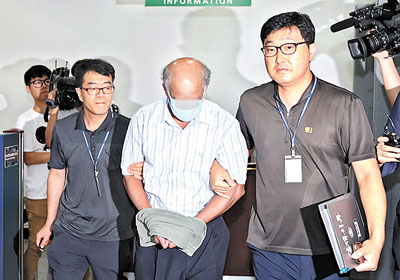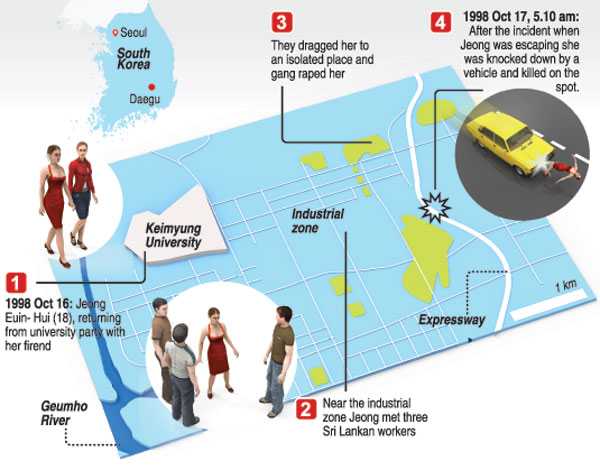News
Charges filed in nick of time could bring justice in 20-year-old rape case
A South Korean family’s hopes of finding justice over the alleged gang-rape of their daughter 20 years ago by three Sri Lankan men in Korea have soared following a decision to pursue charges in this country against the accused. The 18-year-old victim, Jeong Eun-Hui, a university student returning from a late-night party in Daegu city in South Korea, was raped in 1998 near an industrial zone where Sri Lankans worked. In a double tragedy, she was knocked down by a truck and killed on the spot while escaping from the scene of the attack.

The Sri Lankan man, centre, being taken to court in August 2015. [YONHAP
The dead girl’s father pursued the case. In 2013, following his complaints about the slow progress of investigations, Korean police reopened the probe.
They found that the DNA record of a Sri Lankan in South Korea awaiting trial on a 2010 charge of attempting to have a sexual relationship with an underaged girl matched the DNA in the sperm on Jeong Eun-Hui’s clothes.
Police charged the Sri Lankan man, then in his 50s, with the rape of Jeong Eun-Hui. He named two other Sri Lankans he said had joined him in the rape attack. The three men were charged with gang rape but were, however, acquitted due to a law that states a rape charge should be brought within 10 years of such a crime.
The three were tried again, this time on a combined gang rape and robbery charge where the statute of limitations was 15 years, but were again acquitted, this time because the court was not satisfied that testimony regarding the alleged robbery was credible. The man whose sperm was found on the dead girl’s underwear was found guilty of the unrelated 2010 charge of sexual assault and of two other charges of driving without a licence. A resulting 18-month sentence qualified him for deportation. He was deported to Sri Lanka in 2017. The two other suspects in the Jeong Eun-Hui case had separately been deported some years previously when their visas had expired.
The affair received critical media coverage in South Korea, with the authorities condemned for failing to achieve a rape conviction even with evidence available. This led South Korean authorities to look for other means to find justice for Jeong Eun-Hui. They studied statutory limits in Sri Lanka and found that action could be taken against the suspects in a court in this country.
Accordingly, a request was made through diplomatic channels to the Attorney-General’s Department in Sri Lanka. In May this year, a high-powered South Korean delegation that included senior prosecutors, DNA experts and medical experts came to Sri Lanka and held meetings with the Secretary of the Ministry of Justice, the Attorney-General and the Criminal Investigation Department.
On the instructions of the Attorney-General’s Department, the CID commenced investigations and sent a team to South Korea to gather facts and review evidence over two weeks. On October 1, the CID team reported the results of its investigations to the Colombo Fort Magistrates Courts. A case was filed against the three suspects – and just in time. A senior CID official said that under Sri Lankan law action needed to be taken by October 18 this year.
The CID said the suspects have been identified and will be produced in the courts after an order is given.
This is a rare case in which persons will be charged for a crime committed in another country. If successful, this process could be used in similar cases, a CID official said.


